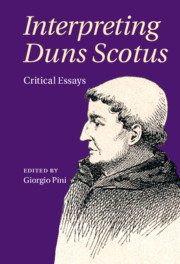Book contents
- Interpreting Duns Scotus
- Interpreting Duns Scotus
- Copyright page
- Contents
- Acknowledgments
- Notes on contributors
- Introduction
- Chapter 1 John Duns Scotus’s life in context
- Chapter 2 The modal framework of Duns Scotus’s argument for the existence of a first cause
- Chapter 3 Duns Scotus on essential order in De Primo Principio and elsewhere
- Chapter 4 Duns Scotus on how God causes the created will’s volitions
- Chapter 5 Duns Scotus on free will and human agency
- Chapter 6 Duns Scotus on the dignities of human nature
- Chapter 7 Duns Scotus on matter and form
- Chapter 8 Duns Scotus, intuitionism, and the third sense of ‘natural law’
- Chapter 9 The bounds of sense: adequacy and abstraction in the later works of Duns Scotus
- Chapter 10 Before univocity: Duns Scotus’s rejection of analogy
- Chapter 11 Analogy after Duns Scotus: the role of the analogia entis in the Scotist metaphysics at Barcelona, 1320–1330
- Bibliography
- Index
Chapter 8 - Duns Scotus, intuitionism, and the third sense of ‘natural law’
Published online by Cambridge University Press: 23 December 2021
- Interpreting Duns Scotus
- Interpreting Duns Scotus
- Copyright page
- Contents
- Acknowledgments
- Notes on contributors
- Introduction
- Chapter 1 John Duns Scotus’s life in context
- Chapter 2 The modal framework of Duns Scotus’s argument for the existence of a first cause
- Chapter 3 Duns Scotus on essential order in De Primo Principio and elsewhere
- Chapter 4 Duns Scotus on how God causes the created will’s volitions
- Chapter 5 Duns Scotus on free will and human agency
- Chapter 6 Duns Scotus on the dignities of human nature
- Chapter 7 Duns Scotus on matter and form
- Chapter 8 Duns Scotus, intuitionism, and the third sense of ‘natural law’
- Chapter 9 The bounds of sense: adequacy and abstraction in the later works of Duns Scotus
- Chapter 10 Before univocity: Duns Scotus’s rejection of analogy
- Chapter 11 Analogy after Duns Scotus: the role of the analogia entis in the Scotist metaphysics at Barcelona, 1320–1330
- Bibliography
- Index
Summary
The will is the key component of Duns Scotus’s moral theory, both because Duns Scotus held (quite uncontroversially) that we are morally responsible only for our free choices and their outcomes and because (more controversially) he thought that most principles detailing what is morally good and what is morally bad depends on God’s free decisions. The key, then, question is how we know contingent practical principles. This essay offers an account of our knowledge of such principles that is (a) consistent with what Duns Scotus says about the relationship of the moral law to the divine will and to human nature, (b) consistent with what he says more generally about our knowledge of contingent truths, and (c) consistent with his actual argumentative practice in dealing with contingent practical principles. The examination of Duns Scotus’s argumentative practice uncovers a third, hitherto unnoticed, sense of ‘natural law’. This essay suggests that the core unifying sense of ‘natural law’ for Duns Scotus is precisely the epistemic status of the precepts of natural law as non-inferentially evident.
- Type
- Chapter
- Information
- Interpreting Duns ScotusCritical Essays, pp. 167 - 183Publisher: Cambridge University PressPrint publication year: 2022
- 1
- Cited by

